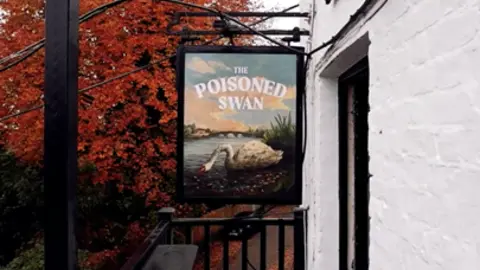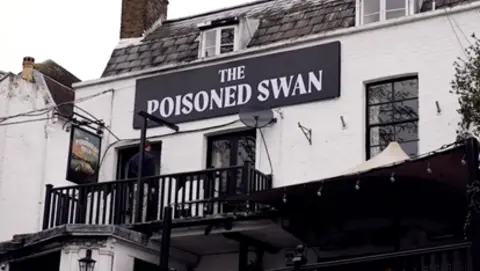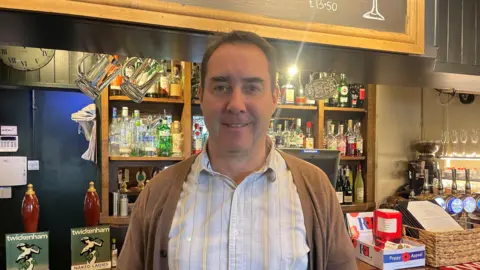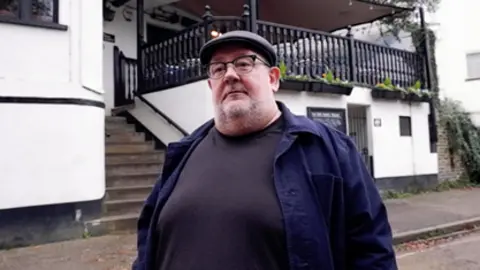Why a pub changed its name to help save swans
 Handout
HandoutThe White Swan in Twickenham is known for its proximity to the Thames, with the road between it and the river regularly disappearing under the changing water levels.
However its unique location inspired those running it to change its name for a day to raise awareness for a charity campaign after discovering smokers were throwing their cigarette butts down drains and in waterways.
The building became The Poisoned Swan for a day, pub manager Kevin O'Callaghan explained, because "it's more personal to us - we're on the river, we see the swans every day".
Actor and comedian Johnny Vegas also visited the pub to show support, having previously been cited and fined himself for flicking a cigarette down a drain.
 Handout
Handout"I think it is a big issue because people, especially smokers, they don't really understand what they're doing wrong," Mr O'Callaghan, 59, said.
"They just think they're trying to be helpful and put their butts down the drain but really what they're doing is just contaminating the water."
"What we need to try and do is try to make them aware that they're making the problem worse, not better."
Despite a nationwide increase in vaping, Mr O'Callaghan said: "If I go outside my pub today there will be four or five cigarette buts around the drain, so it is still a big problem.
"Just find the nearest bin and put them in the bin."
 Handout
HandoutHe added local councils and national agencies should also consider advertising to spread the message, but in the meantime his team has installed more outside bins around the pub.
"We'd encourage any other pub, especially riverside pubs, to do the same thing," he added.
Former smoker Mr Vegas told BBC Breakfast the charity explained to him that parts of the cigarette do not break down but still release microplastics and toxins into the water.
He said changing the pub's name to The Poisoned Swan made him realise "that is literally what I was doing without realising it".
"Ducks will eat them and mistake them for food," he added.
 Handout
Handout"I thought I was keeping the streets clean, I thought I was doing the right thing, I thought it was the safest place with a lit cigarette and putting it in the water.
"I've done it, I hold my hands up."
He added they were not seeking to "vilify" smokers but to hopefully encourage them to bin their cigarette butts instead.
It comes as new research from Keep Britain Tidy found individual drains in the UK have as many as 5,000 cigarette butts dropped in them a year.
Announcing its Bin The Butt campaign, it said cigarettes thrown in drains end up in our waterways, harming wildlife and polluting rivers, and added just one cigarette butt can contaminate up to 1,000 litres (220 gallons) of water.
Its chief executive Allison Ogden-Newton OBE said: "Cigarette butts are full of plastic, they're full of toxic chemicals, and when they go down the drain they end up in our canals, in our rivers and on our beaches," she explained.
Additional reporting by Gopal Virdee.
Listen to the best of BBC Radio London on Sounds and follow BBC London on Facebook, X and Instagram. Send your story ideas to [email protected]
